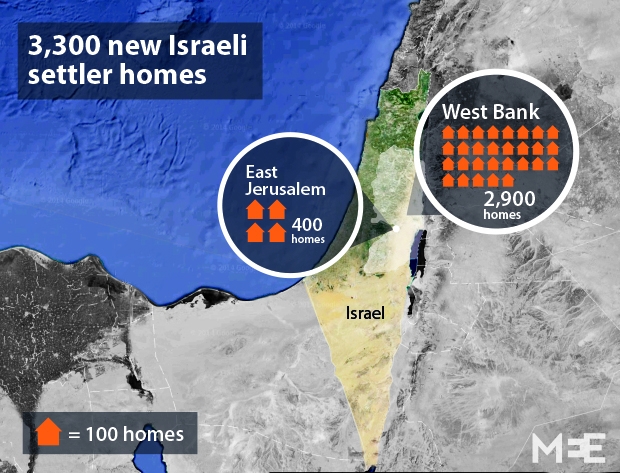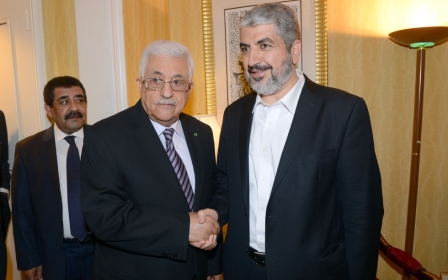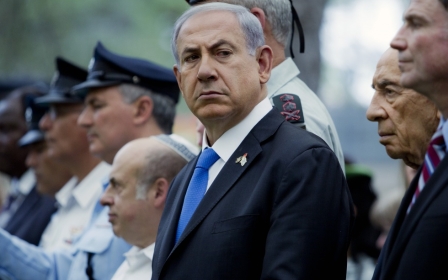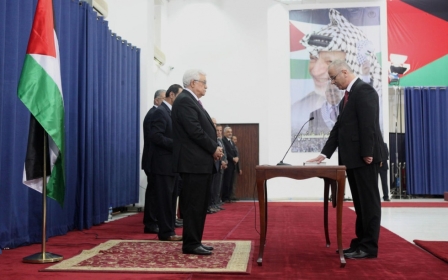Israel plans 3,300 homes in response to unity government

Just hours after issuing tenders for 1,500 housing units, the Israeli government ordered civil servants on Thursday to move forward with plans for another 1,800 settler homes in the West Bank, an official said.
"The political echelon has ordered the Civil Administration to advance 1,800 new units," the Israeli official told AFP on condition of anonymity, referring to a defence ministry unit responsible for all West Bank planning issues.
The order related to construction in 10 separate settlements across the West Bank, all of which are at different stages of the planning process and had been frozen by the government three months ago, according to media reports.
The order on the 1,800 homes comes on the same day as Israeli Housing Minister Uri Ariel invited bids for 1,500 new homes in Jewish settlements.
Both settlement initiatives are thought to be moving forward in retaliation for a new Palestinian government backed by Hamas, reports said on Thursday.
Of the new 1,500 homes, 400 will be in Israeli-annexed east Jerusalem with the rest elsewhere in the occupied West Bank, the online edition of Haaretz newspaper reported.
"I congratulate the decision to give a proper Zionist response to the establishment of the Palestinian terror cabinet," the paper quoted Ariel as saying.
"The right and duty of the state of Israel to build across the country to lower the housing prices is unquestionable, and I believe these tenders are just the beginning," said the minister, who is a member of the far-right Jewish Home party which opposes a Palestinian state.
The announcement comes amid Israeli anger at its US ally's decision to work with the new merged administration for the West Bank and Gaza sworn in by Palestinian president Mahmoud Abbas on Monday with the support of Israeli foe Hamas.
Israel has refused to recognise the new government. As the unity cabinet was sworn in on Monday at the Presidential Palace in Ramallah, three new Hamas ministers missed the ceremony after Israeli authorities prevented them from obtaining travel permits, according to the Palestine News Network.
'Diplomatic mistake'
Israeli Justice Minister and chief peace negotiator Tzipi Livni told Army Radio the country had made a "diplomatic mistake that will only make it more difficult for us to mobilise world opinion against Hamas."
She blamed the Bayit Yehudi party - of which the housing minister is a member - for pressuring the government to issue the day's first batch of tenders.
"This isn't a punishment against Hamas," Livni said. "Its a punishment that the Bayit Yehudi has imposed upon the citizens of Israel."
UK Foreign Secretary William Hague responded to Thursday's announcements saying in a statement that he "deplores" the settlement expansion and "emphasises need for lasting peace".
"Such decisions can only make achieving peace more difficult," Hague said.
“The UK’s position on settlements is longstanding: they are illegal under international law, undermine trust and threaten the viability of the two-state solution," he added. "A negotiated two state solution is the only solution to the Israeli-Palestinian conflict. I urge the leaders of both sides to demonstrate the courage, vision and urgency needed to achieve this.”
The unity deal signed in April between Hamas and the Palestine Liberation Organisation aimed at ending years of bitter rivalry between the Islamist movement and Fatah, which dominates the PLO.
Secretary of State John Kerry defended the US decision on an unannounced visit to Israel's northern neighbour Lebanon on Wednesday.
He said it did not contradict longstanding US and European Union policy that bars all dealings with any Palestinian government involving Hamas until the Islamist movement renounces violence and recognises Israel and past peace deals.
Kerry said Abbas had "made clear that this new technocratic government is committed to the principles of non-violence, negotiations, recognising the state of Israel, acceptance of the previous agreements".
"Based on what we know now about the composition of this technocratic government, which has no minister affiliated to Hamas and is committed to the principles that I describe, we will work with it as we need to, as appropriate," the US top diplomat said.
On Tuesday, the European Union welcomed the new government as "an important step" in Palestinian reconciliation.
But a statement said future support would depend on the government sticking to principles such as the need for a two-state solution and recognising Israel's right to exist.
Israeli Prime Minister Benjamin Netanyahu opposes Europe dealing with the unity government, saying the EU should not accept a "terrorist organisation" - Hamas - being involved in government.
The new 17-member cabinet of independents was sworn in on Monday before president Abbas and held its first ministerial meeting in Ramallah on Tuesday.
In response to the announced formation of the new government Israel has limited the new ministers' freedom of movement between Gaza and the West Bank.
Two ministers stuck in the coastal enclave, justice minister Salim al-Saqa and housing minister Mufid Hasayneh, were installed on Wednesday after Hamas handed over the keys to their offices, as agreed under the unity deal.
Palestinian PM wants Israel pressed over East Jerusalem vote
Palestinian prime minister Rami Hamdallah called on Wednesday for international pressure on Israel to let Palestinians in annexed east Jerusalem vote in an upcoming general election.
Hamdallah's new unity government is tasked with organising parliamentary and presidential elections in the Gaza Strip and West Bank by the end of the year.
But voting in east Jerusalem, which Israel occupied in 1967 and later annexed and the Palestinians envisage as the capital of their promised future state, would require Israeli authorisation.
Meeting foreign delegates in Ramallah Wednesday, Hamdallah urged "the international community to intervene and exert pressure on Israel to hold the elections in east Jerusalem," his office said.
Hamdallah stressed that "the new government will not be able to guarantee a free and democratic elections without east Jerusalem".
The row over the new Palestinian government is further testing the once sacrosanct relationship between Israel and the United States, already strained by the collapse of US-brokered peace talks.
Kerry, who invested huge political capital in the abortive negotiations, said Israel's persistent drive to expand the settlements played a major role in their failure.
The latest expansion announcement came as Palestinians marked the Naksa, or setback, when Israel seized the West Bank in the Six-Day War of 1967, displacing hundreds of thousands of people.
New MEE newsletter: Jerusalem Dispatch
Sign up to get the latest insights and analysis on Israel-Palestine, alongside Turkey Unpacked and other MEE newsletters
Middle East Eye delivers independent and unrivalled coverage and analysis of the Middle East, North Africa and beyond. To learn more about republishing this content and the associated fees, please fill out this form. More about MEE can be found here.





